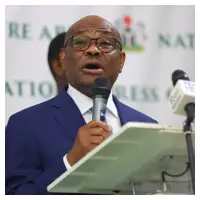Former President Olusegun Obasanjo has revealed why he appointed Sule Lamido, the former governor of Jigawa State, as Nigeria's Foreign Affairs Minister in 1999, stating that the decision became his responsibility after the initially selected candidate declined the position.
Speaking as the Special Guest of Honour at the launch of Lamido's book titled 'Be True to Yourself' in Abuja on Tuesday, Obasanjo explained that Lamido was chosen because of his close relationship with the original ministerial candidate.
"And when we settled, we decided that my candidate would be the vice president and the chairman's candidate would be the foreign minister. But then, the chairman's candidate, who we agreed to be the foreign minister, declined," Obasanjo said.
"And then, the choice of Lamido as foreign minister became my responsibility. Because I saw him as the closest, or one of the closest, persons to the person who had declined to be the foreign minister," the former president added.
Obasanjo highlighted Lamido's admirable character as a key factor in his appointment, particularly praising his ability to speak truth to power. The former president recalled how Lamido refused to provide an undated resignation letter, unlike other ministers who were required to do so.
"Sule Lamido came to me and said, 'You appointed me, and I did not ask you to appoint me. You think I will fall?' I acceded to his request. And of course, he didn't have to give me a letter of resignation, and I had no cause to ask him to give a letter of resignation," Obasanjo recounted.
In response, Lamido expressed profound gratitude to Obasanjo, describing him as his "boss, guide, leader, and inspiration" since 1999. He acknowledged Obasanjo's contributions to the book, including writing the foreword and attending the launch event.
"Baba, I sincerely and profoundly thank you. May God Almighty endow and bless you with abundant health, wisdom, joy, and well-being," Lamido stated.
The 487-page book reportedly includes Lamido's account of his conversation with former military president General Ibrahim Badamosi Babangida in 1993 regarding the annulment of the June 12 election, which was widely believed to have been won by the late Moshood Kashimawo Abiola.













